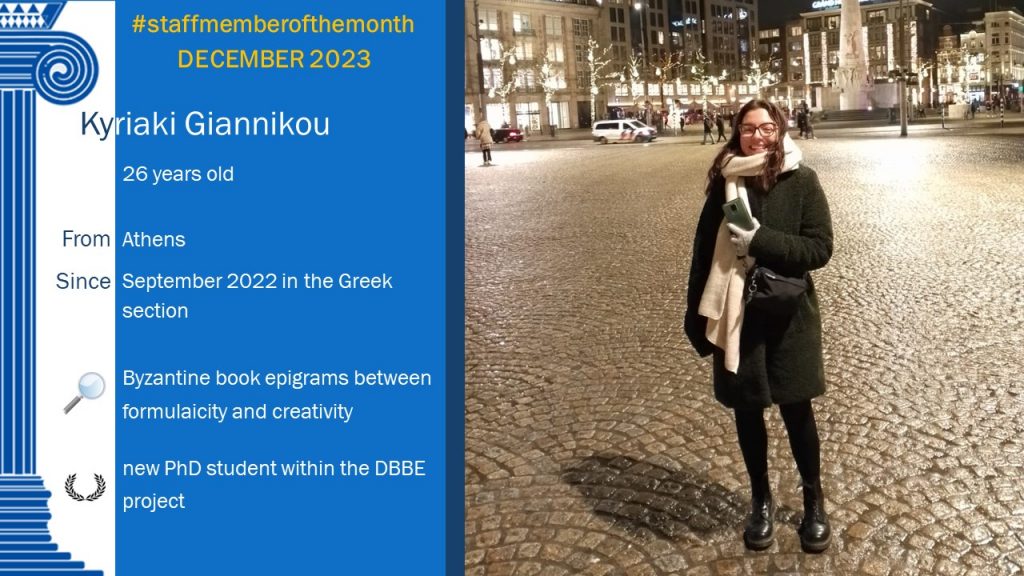The staff member of this month is Kyriaki Giannikou, who recently started her PhD within the framework of the Database of Byzantine Book Epigrams project. Eleonora Cattafi spoke with her about her past and present experiences in Ghent… and some future wishes.

Dear Kyriaki, you have just started your PhD in our Greek section, but you are definitely not a new face around the corridors of the Blandijn! In fact, you came to Ghent as an Erasmus student for the first time: what brought you to Ghent then and what do you remember from that experience? And why have you decided to come back as a scientific employee?
Choosing Ghent as an Erasmus destination in 2019 was a recommendation from one of my professors, and it turned out to be a transformative experience. The academic and social aspects were enriching, and the city itself felt like a welcoming home. Later, after completing my master’s at Leiden University, I seized an opportunity to work as a Research Assistant at Ghent University, in the EVWRIT project. This served as a valuable testing ground, allowing me to explore whether academia was my desired path. The positive working environment solidified my decision to continue as a doctoral student.
You are doing your PhD research within the new DBBE project “Interconnected texts”, which brings together Greek manuscripts, linguistics, and even artificial intelligence. This sounds very exciting! Could you tell us a bit more about your role in the project and the topic of your doctoral investigation?
Certainly! My research revolves around Byzantine book epigrams, intriguing paratexts nestled within manuscript margins. These epigrams intertwine poetic expression with practical details, unveiling insights into manuscript patrons and the identities of the scribes. Despite their formulaic nature, they also exhibit nuanced linguistic variations; these aspects remain unexplored in current research. Acting as a bridge between linguistic research on everyday speech formulas and those in oral poetry, my work addresses the challenge of identifying linguistic patterns within these short, transient epigrams – all within the intricate constraints of written Byzantine Greek.
Acting as a bridge between linguistic research on everyday speech formulas and those in oral poetry, my work addresses the challenge of identifying linguistic patterns within these short, transient epigrams.
From Greece to Belgium, that’s quite a cultural leap! What do you like the most about your daily life in Ghent? Is there anything you would recommend to future international (or Greek) colleagues to feel at home here?
Despite some cultural differences, Ghent has become a second home for me. What I appreciate most about daily life here, coming from the hustle and bustle of Athens, is the serenity of not living in a capital; it might sound minor, but I’ve noticed a significant change since that transition. To future colleagues, I would recommend fully embracing the opportunity to experience a different culture. Diversity enriches the experience, so I encourage them not to limit their social interactions to those within their own cultural circle. In simple terms, let’s stop complaining about the lack of sun and broodjes for lunch!
Every researcher has an artistic side to complement for their scientific activity, so I am sure you have one too! What do you do in order to relax from work?
Outside of academia, I find solace in crafty activities. Knitting, crocheting, and embroidering are not just hobbies but therapeutic outlets for me; yes, it might make me sound like a 75-year-old lady, but I embrace it! The tactile engagement is a perfect counterbalance to the cerebral demands of research! Moreover, I’ve grown to be a proud plant-mum, creating a calming atmosphere to return to after work.
Knitting, crocheting, and embroidering are not just hobbies but therapeutic outlets for me; yes, it might make me sound like a 75-year-old lady, but I embrace it!
Final question. Since New Year is approaching, do you have any special wishes for 2024 or something you look forward in your academic or personal life?
Looking ahead to 2024, I, of course, wish for breakthroughs in my research, contributing to the broader academic discourse. On a personal note, I wish for personal growth and more opportunities to immerse myself in the cultural richness of Belgium. Here’s to a year filled with exploration, achievements, and enriching experiences!
Cheers to that, Kyriaki! And best of luck with your PhD!